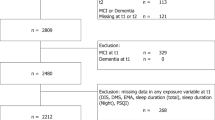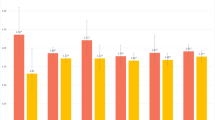Abstract
Although the association between cigarette smoking and risk of mild cognitive impairment (MCI) is controversial, most recent studies have shown that this influence is negative. However, it is unknown how multiple factors of smoking affect MCI, and the mechanisms of different smoking factors are not yet clarified. This study will examine the impact of various angles of smoking on MCI and the potential mediating effects of sleep duration on smoking MCI association in the elderly. In the case group, 109 elderly people who met the inclusion criteria were selected, and 123 were selected in the control group. Participant characteristics include sleep duration and a detailed lifetime history of smoking. After adjusting the relevant covariates, higher odds of MCI occurrence were found in ex-smokers/current smokers; moderate/heavy smokers; smokers for 30–44, 45–59 and more than 60 years; smokers with cumulative smoking duration of 30–44 or more than 60 years and smokers with cumulative dose smoking intensity of 200–399 or 400–599 cigarettes monthly. Elderly subjects who had quit smoking for 21 years or longer were found to have lower odds of MCI occurrence. The indirect effects of smoking on MCI via sleep duration were statistically significant, as the ratio of indirect effect to total effect ranged from 0.14 to 0.29. Smoking affects cognitive function through multi-angles of smoking and influences the cognitive function partly via the duration of sleep.

Similar content being viewed by others
References
Prince M, Wimo A, Guerchet M, Ali GC, Wu YT, Prina M (2015) The global impact of dementia: an analysis of prevalence, incidence, cost and trends. World Alzheimer Rep
Prince M, Comas-Herrera A, Knapp M, Guerchet M, Karagiannidou M (2016) Improving healthcare for people living with dementia: coverage, quality and costs now and in the future. World Alzheimer Rep
Petersen RC, Smith G, Waring SC, Ivnik RJ, Tangalos EG, Kokmen E (1999) Mild cognitive impairment: clinical characterization and outcome. Arch Neurol 56(3):303–308
Baozhen D (2012) Knowledge, attitude, belief, and practice (KABP/KAP) about Alzheimer disease among suspectableindividuals with mild cognitive impairment, Dissertation. University of Wuhan, Wuhan
Mucha L, Stephenson J, Morandi N, Dirani R (2006) Meta-analysis of disease risk associated with smoking, by gender and intensity of smoking. Gend Med 3(4):279–291
Anstey KJ, von Sanden C, Salim A, O'Kearney R (2007) Smoking as a risk factor for dementia and cognitive decline: a meta-analysis of prospective studies. Am J Epidemiol 166(4):367–378. https://doi.org/10.1093/aje/kwm116
Depp CA, Bowie CR, Mausbach BT, Wolyniec P, Thornquist MH, Luke JR, McGrath JA, Pulver AE, Patterson TL, Harvey PD (2015) Current smoking is associated with worse cognitive and adaptive functioning in serious mental illness. Acta Psychiatr Scand 131(5):333–341. https://doi.org/10.1111/acps.12380
WHO (2014) Global status report on non-communicable dieseases 2014. http://apps.who.int/iris/bitstream/10665/148114/1/9789241564854_eng.pdf?ua=1. Accessed 18 Dec 2018
Ma Y (2015) Cohort differences of smoking pattern in chinese population and its social determin. Pop Res 39(6):62–73
Lee PN (1994) Smoking and Alzheimer’s disease: a review of the epidemiological evidence. Neuroepidemiology 13(4):131–144
Brenner DE, van Belle G, Bowen JD, McCormick WC, Larson EB (1993) Relationship between cigarette smoking and Alzheimer’s disease in a population-based case-control study. Neurology 43:293–300
Sabia S, Elbaz A, Dugravot A, Head J, Shipley M, Hagger-Johnson G, Kivimaki M, Singh-Manoux A (2012) Impact of smoking on cognitive decline in early old age: the Whitehall II cohort study. Arch Gen Psychiatry 69(6):627–635. https://doi.org/10.1001/archgenpsychiatry.2011.2016
Mons USB, Müller H et al (2013) History of lifetime smoking, smoking cessation and cognitive function in the elderly population. Eur J Epidemiol 28(10):823–831. https://doi.org/10.1007/s10654-013-9840-9
Almeida OP, Garrido GJ, Alfonso H, Hulse G, Lautenschlager NT, Hankey GJ, Flicker L (2011) 24-month effect of smoking cessation on cognitive function and brain structure in later life. Neuroimage 55(4):1480–1489. https://doi.org/10.1016/j.neuroimage.2011.01.063
Stewart MC, Deary IJ, Fowkes FG, Price JF (2006) Relationship between lifetime smoking, smoking status at older age and human cognitive function. Neuroepidemiology 26(2):83–92. https://doi.org/10.1159/000090253
Peters EN, Fucito LM, Novosad C, Toll BA, O'Malley SS (2011) Effect of night smoking, sleep disturbance, and their co-occurrence on smoking outcomes. Psychol Addict Behav 25(2):312–319. https://doi.org/10.1037/a0023128
Phillips BADF (1995) Cigarette smoking and sleep disturbance. Arch Intern Med 155(7):734–744
Schoenborn C A APF (2008) Sleep duration as a correlate of smoking, alcohol use, leisure-time physical inactivity, and obesity among adults: United States, 2004-2006
Yu JG, Kim CG, Jung SP, Lee KM (2018) Associations between sleep duration and smoked cigarettes per day, heavy smoking in smokers. Korean Journal of Health Promotion 18(1):1. https://doi.org/10.15384/kjhp.2018.18.1.1
Lo JC, Groeger JA, Cheng GH, Dijk DJ, Chee MW (2016) Self-reported sleep duration and cognitive performance in older adults: a systematic review and meta-analysis. Sleep Med 17:87–98. https://doi.org/10.1016/j.sleep.2015.08.021
Ferrie JE, Shipley MJ, Akbaraly TN, Marmot MG, Kivim M, Singh-Manoux A, Singh-Manoux A (2011) Change in sleep duration and cognitive function: findings from the Whitehall II study. Sleep 34(5):565–573
Tworoger SS, Schernhammer ES, Grodstein F (2006) The association of self-reported sleep duration, difficulty sleeping, and snoring with cognitive function in older women. Alzheimer Dis Assoc Disord 20(1):41–48
Wu L, Sun D, Tan Y (2017) A systematic review and dose-response meta-analysis of sleep duration and the occurrence of cognitive disorders. Sleep Breath 22:805–814. https://doi.org/10.1007/s11325-017-1527-0
Zhou HD, Deng J, Li J, Wang Y, Zhang M (2003) Study of the relationship between cigarette smoking, alcohol drinking and cognitive impairment among elderly people in China. Age Ageing 32(2):205–210
WHO (1998) Guidelines for controlling and monitoring the tobacco epidemic. https://doi.org/10.1177/146642409911900119
Heatherton TF, Kozlowski LT, Frecker RC, Fagerstrom KO (1991) The Fagerström test for nicotine dependence: a revision of the Fagerstrom Tolerance Questionnaire. Addiction 86(9):1119–1127. https://doi.org/10.1111/j.1360-0443.1991.tb01879.x
Zhao X, Chen Q (2010) Reconsidering Baron and Kenny: myths and truths about mediation analysis. J Consum Res 37(2):197–206
McEvoy JW, Blaha MJ, DeFilippis AP, Lima JA, Bluemke DA, Hundley WG, Min JK, Shaw LJ, Lloyd-Jones DM, Barr RG, Budoff MJ, Blumenthal RS, Nasir K (2015) Cigarette smoking and cardiovascular events: role of inflammation and subclinical atherosclerosis from the multi-ethnic study of atherosclerosis. Arterioscler Thromb Vasc Biol 35(3):700–709. https://doi.org/10.1161/ATVBAHA.114.304562
Kuller LH, Lopez OL, Mackey RH, Rosano C, Edmundowicz D, Becker JT, Newman AB (2016) Subclinical cardiovascular disease and death, dementia, and coronary heart disease in patients 80+ years. J Am Coll Cardiol 67(9):1013–1022. https://doi.org/10.1016/j.jacc.2015.12.034
Henderson VW (2014) Three midlife strategies to prevent cognitive impairment due to Alzheimer’s disease. Climacteric 17(sup2):38–46
Spilich GJ, Renner J (1992) Cigarette smoking and cognitive performance. Addiction 87(9):1313–1326
Ernst M, Heishman SJ, Spurgeon L, London ED (2001) Smoking history and nicotine effects on cognitive performance. Neuropsychopharmacology 25(3):313–319
Gallinat J, Meisenzahl E, Jacobsen LK, Kalus P, Bierbrauer J, Kienast T, Witthaus H, Leopold K, Seifert F, Schubert F, Staedtgen M (2006) Smoking and structural brain deficits: a volumetric MR investigation. Eur J Neurosci 24(6):1744–1750. https://doi.org/10.1111/j.1460-9568.2006.05050.x
Buckner RL (2004) Memory and executive function in aging and AD: multiple factors that cause decline and reserve factors that compensate. Neuron 44(1):195–208. https://doi.org/10.1016/j.neuron.2004.09.006
Gons RA, van Norden AG, de Laat KF, van Oudheusden LJ, van Uden IW, Zwiers MP, Norris DG, de Leeuw FE (2011) Cigarette smoking is associated with reduced microstructural integrity of cerebral white matter. Brain 134(Pt 7):2116–2124. https://doi.org/10.1093/brain/awr145
Lubin JH, Albanes D, Hoppin JA, Chen H, Lerro CC, Weinstein SJ, Sandler DP, Beane Freeman LE (2017) Greater coronary heart disease risk with lower intensity and longer duration smoking compared with higher intensity and shorter duration smoking: congruent results across diverse cohorts. Nicotine Tob Res 19(7):817–825. https://doi.org/10.1093/ntr/ntw290
Lubin JH, Couper D, Lutsey PL, Woodward M, Yatsuya H, Huxley RR (2016) Risk of cardiovascular disease from cumulative cigarette use and the impact of smoking intensity. Epidemiology 27(3):395–404. https://doi.org/10.1097/EDE.0000000000000437
Yarnell JW, Sweetnam PM, Rogers S, Elwood PC, Bainton D, Bake IA (1987) Some long term effects of smoking on the haemostatic system: a report from the Caerphilly and Speedwell Collaborative Surveys. J Clin Pathol 40(8):909–913
Bots ML, Breteler MMB, Kooten FV, Haverkate F, Meijer P, Koudstaal PJ (1998) Coagulation and fibrinolysis markers and risk of dementia. Haemostasis 28(3–4):216–222
Elwood PC, Gallacher JEJ (2001) Cognitive function and blood rheology: results from the Caerphilly cohort of older men. Age Ageing 30(2):135–139
Durazzo TC, Korecka M, Trojanowski JQ, Weiner MW, O’ Hara R, Ashford JW, Shaw LM (2016) Active cigarette smoking in cognitively-normal elders and probable Alzheimer’s disease is associated with elevated cerebrospinal fluid oxidative stress biomarkers. J Alzheimers Dis 54(1):99–107. https://doi.org/10.3233/jad-160413
Zhang L, Zhang HQ, Liang XY, Zhang HF, Zhang T, Liu FE (2013) Melatonin ameliorates cognitive impairment induced by sleep deprivation in rats: role of oxidative stress, BDNF and CaMKII. Behav Brain Res 256:72–81. https://doi.org/10.1016/j.bbr.2013.07.051
Yamauchi M, Nakano H, Maekawa J, Okamoto Y, Ohnishi Y, Suzuki T (2005) Oxidative stress in obstructive sleep apnea. Chest 127(5):1674–1679
Lusic KL, Valic M, Pecotic R, Pavlinac DI, Dogas Z (2017) Good and poor sleepers among OSA patients: sleep quality and overnight polysomnography findings. Neurol Sci 38(7):1299–1306. https://doi.org/10.1007/s10072-017-2978-6
Kahlil H (2017) Evidence summaries: melatonin for sleep disturbances in dementia. Aust Pharm 36(1):27
McDade E, Bateman RJ (2017) Stop Alzheimer’s before it starts. Nat News 547(7662):156–162
Mawuenyega KG, Sigurdson W, Ovod V, Munsell L, Kasten T, Morris JC, Yarasheski KE, Bateman RJ (2010) Decreased clearance of CNS β-amyloid in Alzheimer’s disease. Science 330(6012):1774–1774. https://doi.org/10.1126/science.1197623originally
Kitaguchi N, Kawaguchi K, Sakai K (2018) Removal of blood amyloid as a therapeutic strategy for Alzheimer’s disease: the influence of smoking and nicotine. In: Akaike A, Shimohama S, Misu Y (eds) Nicotinic acetylcholine receptor signaling in neuroprotection. pp 173–191
Ju YE, Holtzman DM (2014) Sleep and Alzheimer disease pathology-a bidirectional relationship. Nat Rev Neurol 10(2):115–119
Hu M, Zhang P, Li C, Tan Y, Li G, Xu D, Chen L (2017) Sleep disturbance in mild cognitive impairment: a systematic review of objective measures. Neurol Sci 38(8):1363–1371. https://doi.org/10.1007/s10072-017-2975-9
Author information
Authors and Affiliations
Corresponding author
Ethics declarations
Conflict of interest
The authors declare that they have no conflict of interest.
Additional information
Publisher’s note
Springer Nature remains neutral with regard to jurisdictional claims in published maps and institutional affiliations.
Electronic Supplementary Material
ESM 1
(DOCX 19 kb)
Rights and permissions
About this article
Cite this article
Hu, M., Yin, H., Shu, X. et al. Multi-angles of smoking and mild cognitive impairment: is the association mediated by sleep duration?. Neurol Sci 40, 1019–1027 (2019). https://doi.org/10.1007/s10072-019-03750-5
Received:
Accepted:
Published:
Issue Date:
DOI: https://doi.org/10.1007/s10072-019-03750-5




